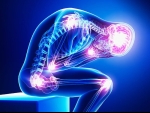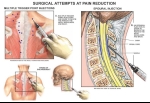Home »
Blog » Back Pain
| Stem Cell, PRP, Acupuncture in Queens & Long Island, New York
Back Pain | Stem Cell, PRP, Acupuncture in Queens & Long Island, New York
Tags: Back Pain | Posted on: 16-Apr-2021 | No of views: 3500 Unsupported postures cause the loads on your spine to disperse incorrectly, weakening the tissues in your lower back. As a result, the intricate network of muscles, discs, and joints in your back tend to be pushed beyond their tolerable limit, causing pain. Likewise, a sudden injury from lifting a heavy object incorrectly can cause immediate back pain and dysfunction. Here are the most common back postures that lead to pain and actions you can take to correct them.
Read more
Tags: Back Pain | Posted on: 14-Apr-2021 | No of views: 3387 Back Pain Specialists Are Ready to Help - The discs in our spine help keep the vertebrae steady and absorb shock. Over time, these discs wear down, which can cause persistent pain in the back or neck. This typically occurs between the ages of 30 and 60. If you are suffering from back pain, you’re likely having trouble living your day-to-day life without interruption. Thankfully, solutions are available. Disc-related back pain is a very common problem and it can often be treated without surgery.
Read more
Tags: Back Pain | Posted on: 09-Apr-2021 | No of views: 3824 When your back muscle fibers become overstretched or torn called a back muscle strain your body’s natural response is to initiate an inflammatory cascade that causes swelling and may be accompanied by painful spasms. Quick treatment may help reduce symptoms and speed recovery. Here’s how: Stop What You’re Doing - When your back pain suddenly flares up, discontinue the physical activity that you’re doing. It is important to protect your lower back from further injury. Don’t push through your workout or continue to do chores around the house. Overusing a strained back muscle may worsen the damage and delay the recovery.
Read more
Tags: Back Pain | Posted on: 07-Apr-2021 | No of views: 3295 Degenerative Disc Disease (DDD) is the weakening and breakdown of one or more vertebral discs, a structure that sits between the bones in the spine to provide cushioning and allow movement between the spine levels. This condition can develop as a natural part of the aging process, but it may also result from injury. Even though “disease” is in the name, this process is local wear and tear of the spine and is not a part of a systemic illness. DDD most often occurs in the low back, or lumbar spine, but can affect the neck and mid-back as well.
Read more
Tags: Back Pain | Posted on: 31-Mar-2021 | No of views: 3456 Abnormal Pain That Extends Beyond the Expected Period of Healing - Chronic pain is an enormous problem in the United States, costing millions in lost workdays and decreased efficiency. Chronic pain causes local or widespread pain that remains long after a person recovers from an illness or injury. Unlike short-term pain, chronic pain is abnormal and is considered a disease in itself. If you are one of 100 million Americans who suffer from chronic pain, a pain specialist can treat your pain and help you regain control over your life.
Read more
Tags: Back Pain | Posted on: 26-Mar-2021 | No of views: 3740 Pain in the upper and/or middle back can be quite limiting and interfere with daily activities. To help alleviate this pain, consider stretching and strengthening the muscles that support your thoracic spine (upper and mid-back). Here are 5 common exercises to try.
Press-Up Exercise - This press-up or back extension exercise targets your back extensor muscles, which are attached to the back of your spine.
Read more
Tags: Back Pain | Posted on: 24-Mar-2021 | No of views: 3261 Pain due to arthritis, trauma, or degeneration that affects the spine and surrounding tissues - The spine is a vital structure that supports the body while providing enough flexibility for movement. The spine is divided into the neck (cervical area), middle back (thoracic area), and lower back (lumbar area). Areas that sustain a lot of twisting and bending, such as the lower back, are most likely to get injured. It is estimated that 80% of the population will have lower back pain, or lumbago, in their lifetime.
Read more
Tags: Back Pain | Posted on: 22-Mar-2021 | No of views: 5216 The human body is amazingly complex and integrated in a way in which everything is somehow connected. And this fact can be made abundantly clear when a problem develops in one area and your nerves cause symptoms (in this case, pain) to radiate outward. When this happens, trigger point injections go straight to the source of your pain to bring you relief.
Read more
Tags: Back Pain | Posted on: 19-Mar-2021 | No of views: 3823 Your lower back is a superb feat of engineering it’s strong, weight-bearing, and sturdy, yet highly flexible with a range of motion in all directions. Understanding the anatomy of your lower spine can help you communicate more effectively with the medical professionals who treat your lower back pain. Here is a description of useful anatomical landmarks.
The Lordotic Curve - Your lower back (lumbar spine) is the anatomic region between your lowest rib and the upper part of the buttock.
Read more
Tags: Back Pain | Posted on: 17-Mar-2021 | No of views: 4008 Painful Spine Problem Can Be Effectively Treated Annular tears can cause fluid to leak out of vertebral discs of the spine, irritating nearby nerves, causing significant pain, numbness, and tingling in the back, neck, or legs. Annular tears are most often the result of normal wear and tear associated with the aging process. Since the tears may not fully heal, the risk of re-injury is high.
Read more
Love this Post? Spread the World






















